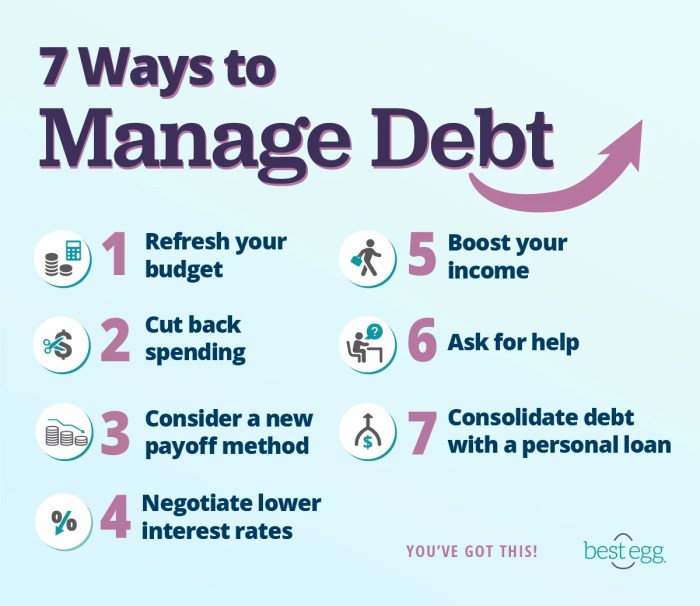Get ready to dive into the world of debt management tips, where financial stability meets strategic planning in an epic showdown. Buckle up as we explore the ins and outs of managing debt like a boss.
In this article, we’ll break down the importance of effective debt management, provide practical tips for creating a personalized debt management plan, explore strategies for managing debt effectively, and offer budgeting tips for smooth debt repayment. So, grab your notebooks and let’s get started!
Importance of Debt Management

Effective debt management is crucial for financial stability because it helps individuals or organizations maintain control over their finances, avoid falling into a debt trap, and achieve long-term financial goals. By managing debt wisely, one can reduce financial stress, improve credit scores, and build a solid financial foundation for the future.
Consequences of Poor Debt Management
Poor debt management can lead to a myriad of negative consequences, including:
- Accumulation of high-interest debt
- Damage to credit score
- Increased financial stress
- Possible bankruptcy
Benefits of Having a Well-Thought-Out Debt Management Plan
Having a well-thought-out debt management plan can provide numerous benefits, such as:
- Reduced interest payments
- Improved credit score
- Lower financial stress
- Ability to achieve financial goals
Tips for Creating a Debt Management Plan
Creating a personalized debt management plan is crucial for taking control of your finances and working towards a debt-free future. By following these step-by-step tips, you can develop a plan that fits your unique financial situation.
Setting Financial Goals
When developing a debt management strategy, it’s essential to set clear financial goals. Determine how much debt you want to pay off, by when, and how much you can realistically afford to allocate towards your debt each month. Setting achievable goals will help you stay motivated and focused on your journey towards financial freedom.
Prioritizing and Organizing Debts
One key aspect of a debt management plan is prioritizing and organizing your debts. Start by listing all your debts, including outstanding balances, interest rates, and minimum monthly payments. Consider tackling high-interest debts first to save money on interest payments in the long run. You can choose to use the snowball method, where you pay off the smallest debts first, or the avalanche method, where you focus on the debts with the highest interest rates.
Strategies for Managing Debt Effectively
Dealing with debt can be overwhelming, but there are effective strategies you can use to take control of your financial situation.
Negotiating with Creditors
When faced with high-interest rates or unmanageable debts, it’s crucial to communicate with your creditors. Be open about your financial difficulties and try to negotiate lower interest rates or settle debts for a reduced amount. Remember, creditors want to work with you to recover their money, so don’t be afraid to reach out and discuss your options.
Snowball and Avalanche Methods
Two popular methods for paying off debts are the snowball and avalanche techniques. With the snowball method, you focus on paying off your smallest debt first, then move on to the next one. This approach can provide a sense of accomplishment as you eliminate debts one by one. On the other hand, the avalanche method involves prioritizing debts with the highest interest rates first, which can save you money in the long run. Choose the method that aligns best with your financial goals and stick to your repayment plan.
Debt Consolidation
Consolidating your debts can simplify your repayment process by combining multiple debts into a single loan with a lower interest rate. This can make it easier to manage your payments and potentially reduce the total amount you owe. However, be cautious when considering debt consolidation, as it may not be the best solution for everyone. Evaluate your options and consult with a financial advisor to determine if debt consolidation is the right choice for you.
Budgeting Tips for Debt Repayment
Creating a budget is crucial when it comes to managing debt payments effectively. It helps you track your expenses, prioritize your payments, and ensure you have enough cash flow to cover your debts each month.
Importance of Budgeting for Debt Repayment
- By setting a budget, you can allocate specific amounts towards debt repayment, preventing overspending in other areas.
- Tracking your expenses allows you to identify areas where you can cut back and allocate more funds towards paying off debt.
- Having a budget gives you a clear overview of your financial situation and helps you stay organized in managing your debt obligations.
Tools and Techniques for Tracking Expenses
- Utilize budgeting apps like Mint, YNAB (You Need a Budget), or PocketGuard to track your expenses automatically and categorize them for better visibility.
- Create a spreadsheet or use financial management software like Quicken to manually input your expenses and monitor your cash flow.
- Set up alerts and notifications on your bank account to keep you informed of any unusual spending patterns or upcoming payments.
Budgeting Apps for Debt Repayment
- Debt Payoff Planner: This app helps you create a customized debt repayment plan based on your financial situation and goals.
- EveryDollar: A budgeting app that follows the zero-based budgeting approach, where every dollar has a designated purpose, including debt repayment.
- GoodBudget: Allows you to allocate funds into different envelopes for various expenses, including debt payments, to ensure you stay on track.
